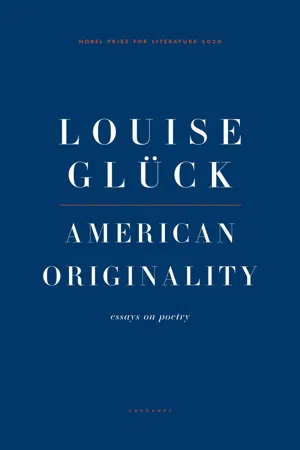63
Author’s Note
Sometime in the late 1990s, Stephen Berg asked me if I might be willing to judge the APR/Honickman First Book Prize, a first-book competition overseen by The American Poetry Review, of which Stephen was an editor; the winning manuscript would be published by Copper Canyon. I had come to trust Stephen Berg tremendously. He had persuaded me, some years before, to try writing critical prose (Wendy Lesser had been independently urging the same idea). That practice had already had valuable benefits, not the least of which was the plea sure of having, more frequently and more steadily, an ongoing project. The Honickman Prize manuscripts were to be screened by Stephen and his staff; I could see as many or as few as I liked. I agreed, on the understanding that I would see as many books as possible (ideally all), since that seemed the only way the award would reflect my judgment. And on the condition, also, that Stephen would read my introduction to be sure it contained no egregious errors.
I could not have anticipated the sustained elation this task afforded. Cartons began to arrive. I had by this point in my life long experience of 64 cartons, but for the first time they were a source of excitement, not objects of dread. I was reading to fall in love: panning for gold was how I saw it. I don’t know how many books there were. Many. And subsequently many piles. The consider seriously pile. The maybe pile. The unlikely but not impossible pile. There were, in any case, a number of extraordinary and radically different books; the book I chose, in the end, was the one among those finalists least like me (which I thought would do the book good). The introduction, which I had feared, was thrilling to write. I felt I had discovered an immense talent; the act of describing it took on a genuine urgency, not unrelated to messianic fervor.
As is obvious from what follows, I judged (in short order) other first-book prizes. Almost immediately after the Honickman Prize, the Bakeless Prize, for which Michael Collier, who supervised the series, had devised impressive protocols. The manuscripts were void of identifying marks. No author’s name. And, less obviously, no acknowledgments page. Screening was done by a group of poets chosen by the current judge. That same year, I was asked to judge the Yale Younger Poets Prize. This meant a terrifying five-year commitment. I feared the obligation to produce, year after year, a prose foreword. I feared there would be, certain years, no manuscript that excited me. But finalists, to whom I had by then begun writing detailed letters, could now be invited to resubmit their books. Many did, some several times. And profound relationships developed: with the work that I was reading over those years, and often with the authors, whom I would meet, when possible, for extended conferences. Not all of these books won the Yale prize. But many won other prizes, or found homes with eminent publishers. I stayed on as judge for three years beyond the original five, at which point it seemed time for another taste to determine so significant an honor (and for my own students to be free to submit their work).
Each of these books has its own narrative. Some few changed very little between initial acceptance and publication. But most changed strikingly, 65 through patient, obsessive, often inspired revision. In the ten years during which these introductions were written, I was being exposed to writers of surpassing originality, some of the most exciting writing in our language. It was one of the great experiences of my life.
67
IN THE SURGICAL THEATRE / DANA LEVIN
Frank Bidart has remarked of the poet David Matias that he wrote as one in the grip of a story. In Matias’s case, the story was AIDS, its power simultaneously destructive and generative.
The remark can be adapted to describe Dana Levin’s first collection. For story substitute image: at the book’s center (and reaching into all the surrounding material) is the surgical theatre, an image, like Plath’s bees, meta phorically fertile, its manifold resonances revealed through Levin’s extraordinary and demanding intelligence. The danger of such powerful figures is the danger of lesser imagination, imagination content with the first circle of revelation. What in such a smaller talent might have proved repetitious, banal, self-glorifying, is, here, the heart of an astonishing book.
The richness of its center derives from ambiguity: the raised scalpel—healing that looks like assault. A healing, an assault, aimed, often, at a baby, so that the hovering knives become at once an image of salvation and the first impression of a lethal world. The recurring figure has the feel, or, more accurately, the 68force of biography, of lived experience. But it is biography wholly transmuted into metaphor, which is to say Levin’s experience (what ever it is, whether she is patient or surgeon) is life not simply lived through but thought through: the authority of the real combined with the larger evocativeness of imagination.
Do you know if you want it? Is that jumble of spit and bone
so worth it
that you would go down again and be
a body
raging with loss, each beat of the heart
like the strike of a hammer,
spiking the nails in, to feel, to feel—
I learned this from you, Father, all my life
I’ve felt your resign to the hurt
of living,
so I came up here, to the scaffolding above
the surgical theatre
to watch you decide.
Can you go on with this mortal vision? …
—“IN THE SURGICAL THEATRE”
The book begins, though, in disturbing tranquility:
The assistants lift him gently,
gently. For a moment, the one lifting under his arms
is in the attitude of an artistic
sorrow—It is
the Deposition, the taking down of the god.
69In the stillness of death, there is activity. Less vi...




